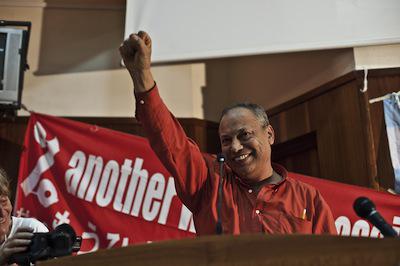
World Social Forum 2011, Dakar,
Senegal. Demotix/El Korchi Abdellah.
The World Social Forum (WSF) will hold its next global gathering
in March 2015 in Tunis. What has happened since it first convened in Porto
Alegre in 2001? At the beginning, the forums took place annually around the
same dates as the World Economic Forum in Davos. One reason for the
simultaneity was that it seemed attractive for the global media. Organized
every two years since 2007, and no longer necessarily during the dates of
Davos, the event has now become somewhat less visible.
For many of the original
participants, the novelty factor no longer holds sway and initial enthusiasm
has partially faded away. But what has compensated for this is the entry of
various new movements and activists into the process, recently in particular
from North and West Africa. The continental dynamics have also differed: while
there has been lots of energy in regional forum processes in the United States
and Canada, the European Social Forum has for all practical purposes ceased to
exist.
Dilemmas of
representation
The latest global WSF event
organized in Tunis in 2013 gave a new boost to the process, but various old
issues keep on returning. Some of the reasons for the frustration with the WSF
are related to dilemmas of representation. For the activists that reject
representation as a political principle, the forums have been too embedded in
traditional politics. For those who want to build global political parties, the
WSF’s open space has lacked the capacity for action.
The WSF has never claimed to
represent a global civil society, or anything else for that matter. This makes
perfect sense, most obviously because there are many important organizations
and movements that have never participated in the process. It is in the
internal decision-making procedures where the representational ambiguity of the
WSF has been more contested.
On the one hand, the governance
bodies of the WSF have mostly consisted of representatives of organizations and
movements. We, for example, have participated in its International Council (IC)
as representatives of the Network Institute for Global Democratization. Within
the IC, this representational foundation has been combined with elements
typical of contemporary non-representational activism, such as consensus-based
decision making.
One of the most debated
characteristics of the IC has been the avoidance of policy statements claiming
to represent a common position. This avoidance has also frustrated the hopes of
those who believed the WSF could develop into a global political actor. While
many of the movements that may have preferred a more politically proactive
forum are still part of the process, including the global peasant alliance Via
Campesina, some have lost faith in the strategic importance of the WSF. An
additional reason, especially for the movements in the South American continent
that gave birth to the WSF, is that compared to 2001 there are today more
left-leaning governments that may offer meaningful channels for transformative
action.
Its ambiguities and the
uncertainty about its future notwithstanding, the WSF remains a relevant space
for the articulation of thousands of movements from around the world. While the
global event is its most widely known aspect, the process includes local,
national, regional and thematic forums in different parts of the world.
Nevertheless, some of the momentum of the past decade may have been lost.
This state of affairs concerns
social movements and organizations beyond the WSF. Has the global justice
movement that appeared at the turn of the millennium disappeared into the
darkness of defeat? Have some of its participants been co-opted by the Latin
American electoral left turn? Or is this multifaceted movement only situated away
from the gaze of the global public eye, and working at what it does best –
long-term local struggles for justice, equality and sustainability?
*
To read more, please click here.